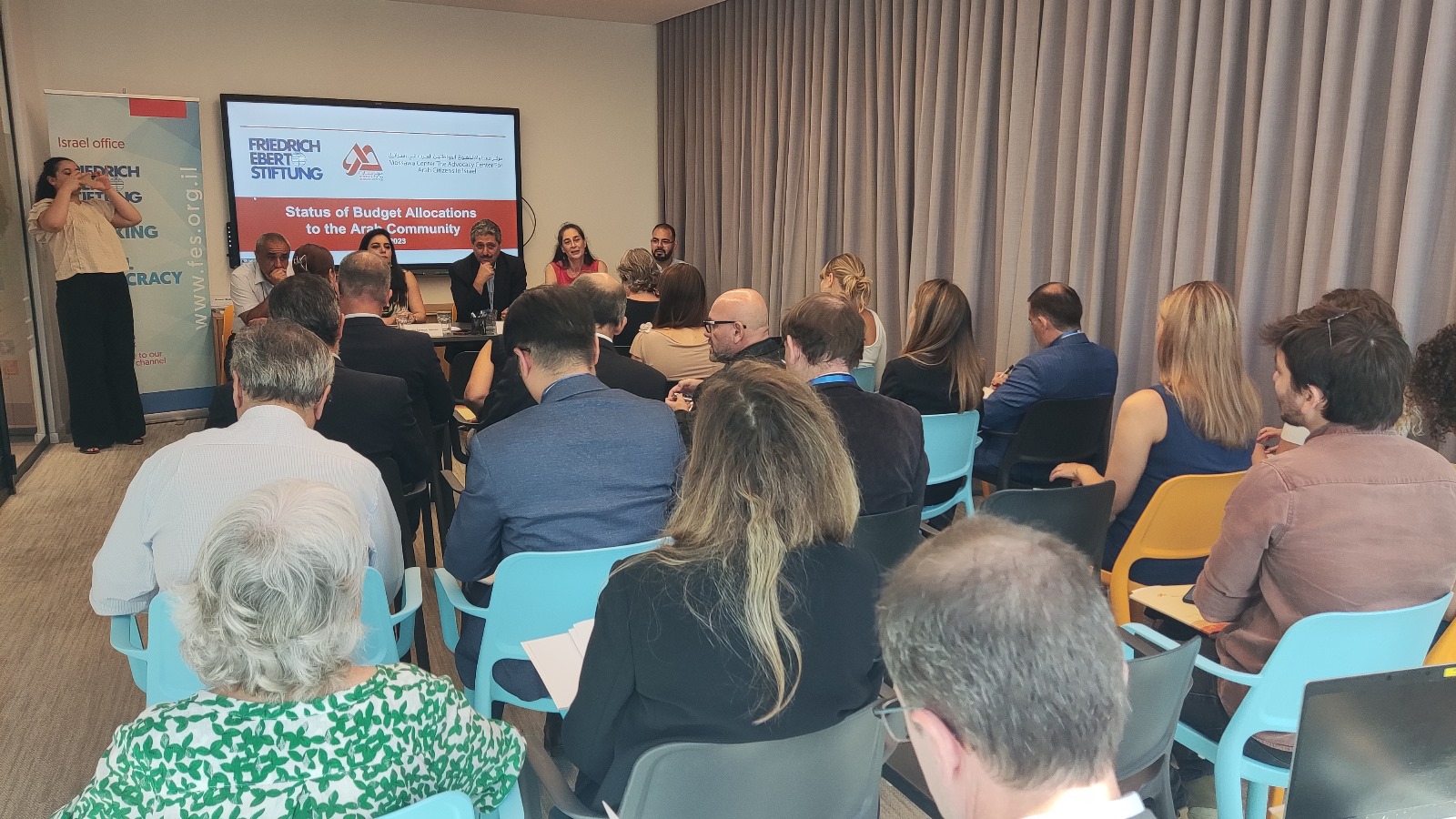
On Thursday, the 31st of August, the Mossawa Center in cooperation with the Friedrich Ebert Foundation met with representatives from over 17 embassies, among those the Canadian ambassador Lisa Stadelbauer, and Chilean ambassador Jorge Carvajal San Martin, to discuss the cuts in the Israeli State Budget and their impacts on the Arab-Palestinian community in Israel. Further topics of debate were the upcoming elections, women’s presence in local politics, and Arab organized crime. The mayor of the Arab village Ara-Arara and chairman of the National Committee of Heads of Arab Local Authorities, Mudar Younes, was one of the speakers and explained among other things the disastrous situation in Arab schools, shootings and killings within the Arab community, and the systematic discrimination of the government towards Arab-Palestinian localities. Moreover, Judith Stelmach, director of the Friedrich Ebert Foundation office in Israel and host of the event, was opening and framing the briefing. Mossawa’s director Jaffar Farah, as well as Suha Salman Mousa, executive director of Mossawa, and Mohammad Abu Leil, Mossawa’s economist, were present as speakers as well.
Judith Stelmach opens the meeting by introducing the work of the Friedrich Ebert Foundation, as well as the briefing’s purpose. Stelmach emphasizes the importance of updating the various embassies on the current situation in regard to budgetary state allocations to the Arab community in Israel. She explains that the main goal of their work in Israel is the creation of a basis for a shared society. Therefore, their work with Mossawa is a crucial factor as “you cannot have a shared society and (…) equality (…) without stopping discrimination against groups of citizens in this country” which includes ending the budgetary discrimination against Arab Palestinians, according to Stelmach. Next, Suha Salman Mousa introduces herself and the Mossawa Center and highlights the importance of the embassies’ representatives’ presence. She explains that one of Mossawa’s major fields of operation is the focus on “socioeconomic development in the Arab community” and that “[Mossawa’s] state budget analysis and advocacy address[es] the socioeconomic gaps between the Jewish community and the Arab community and indicates the needs of the Arab community from the state budget”. Ara-Arara’s mayor Mudar Younes then introduces his work and the deteriorating situation that concerns all 67 Arab communities in the country because of the discrimination of the Arab society “in the allocations by the government of Israel in the fields of education, municipalities, transportation; everything”. Younes talks about the many infrastructural problems in his village, the lack of electricity, house demolition orders from the government, and the increasing organized crimes.
Subsequently, Jaffar Farah starts the presentation of the findings of Mossawa’s economic unit’s analysis of the Israeli state budget showing its lack of funds for Arab localities and institutions. In 2022, the Israeli government approved Government Resolution 550- a 5-year economic development plan for the Arab society- attempting to close the socioeconomic gap between the Jewish and the Arab society. However, the funds for 2022 were already postponed until November, and it is unlikely that they will be allocated and implemented by now. For 2023, the implementation of 1.9 billion NIS is still not clear facing several barriers in the allocation of the funds by ministries such as the ministry of finance, education, or transportation. The lack of funds in plenty of fields leads to extensive poverty within the Arab community with more than half of the Arab population living below the poverty line. The consequences of the lack of funds are moreover an insufficient education system causing more school dropouts which in turn increases the crime and violence rate among Arab youth as they tend to be easily recruited for organized crimes. Mudar Younes talks about his colleague Sohil Diab, mayor of Tamra, who was not able to attend today’s meeting because of a previous shooting in his house by Mafia members. The easy access to illegal weapons, the lack of Arab representatives in local politics and the different ministries, as well as the lack of police protection of the Arab community, facilitate the implementation and the severe rise of organized crimes. Suha Salman Mousa ultimately describes Mossawa’s Mahaal-i project that empowers women to participate in local politics by providing them with needed skills and knowledge as “we [the Mossawa Center] think and believe that women should take part of the decisions that affect directly our community, especially in local councils”. The briefing came to an end with room for questions by the attendees that were answered by Jaffar Farah, Mudar Younes, and Suha Salman Mousa.









